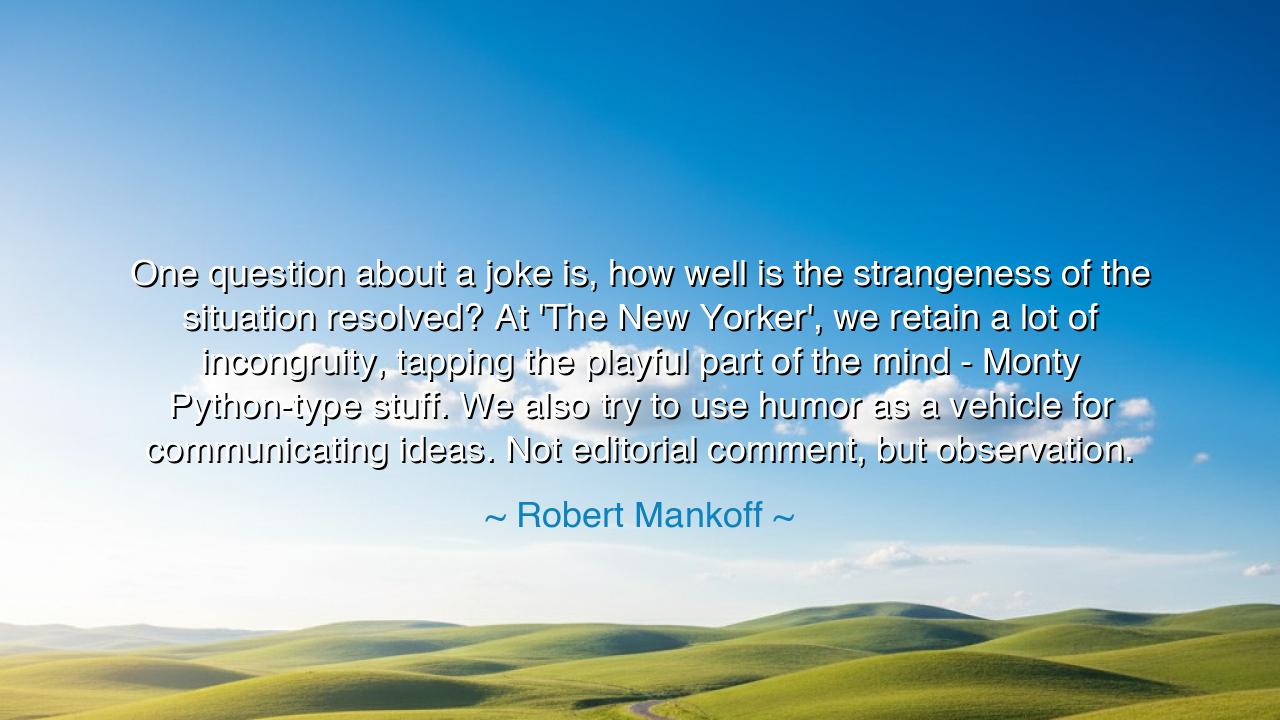
One question about a joke is, how well is the strangeness of the
One question about a joke is, how well is the strangeness of the situation resolved? At 'The New Yorker', we retain a lot of incongruity, tapping the playful part of the mind - Monty Python-type stuff. We also try to use humor as a vehicle for communicating ideas. Not editorial comment, but observation.






In the vast theater of human expression, where every word, every gesture, and every moment carries the weight of meaning, there is a subtle art—a balance between strangeness and resolution—that, when captured, allows humor to transform ordinary life into something profound and illuminating. Robert Mankoff, the esteemed editor of The New Yorker, reflects on this delicate art when he says, "One question about a joke is, how well is the strangeness of the situation resolved? At 'The New Yorker', we retain a lot of incongruity, tapping the playful part of the mind - Monty Python-type stuff. We also try to use humor as a vehicle for communicating ideas. Not editorial comment, but observation." In these words, Mankoff speaks to the essence of what makes humor truly powerful: it is not just about making people laugh, but about using that laughter to illuminate truths, to poke at reality, and to reveal the deeper absurdities of life that we may otherwise overlook.
In the ancient world, the great philosophers and poets knew well that humor was not merely a means of entertainment, but a vehicle for deeper insights. Aristophanes, the master of ancient Greek comedy, used humor not to simply amuse, but to reflect on the society of his time. His plays, filled with incongruity and absurdity, were often laced with sharp social commentary. But the humor of Aristophanes was never heavy-handed; it tapped into the playful nature of the human mind, inviting the audience to laugh, but also to reflect on the truths of their own world. In this way, Mankoff’s approach to humor—using incongruity to tap into the playful mind—finds its roots in these ancient traditions, where humor serves not just to entertain, but to illuminate the complexities of the human experience.
Consider the great comedies of Shakespeare, who, much like Aristophanes, blended absurdity and meaning. In A Midsummer Night’s Dream, Shakespeare wove a world full of strangeness—love potions, magical transformations, and mistaken identities—but in the end, these moments of incongruity resolved in a way that made the absurd seem utterly human. The humor, in this sense, is not merely a distraction but a vehicle for understanding the deeper layers of the characters and their emotions. Mankoff’s observation about strangeness and resolution echoes this same idea—the power of humor lies in its ability to reveal, through the most absurd situations, the profound truths of life.
In the tradition of Monty Python, the humor was marked by an almost frenetic and bizarre absurdity. Yet even in the strangest of sketches, there was always a resolution, a way of bringing the chaos back to a point of reflection. Monty Python used humor not only to make us laugh but to disrupt the normal flow of thinking and to force us to see things from a new angle. Their playful absurdity was never random for the sake of randomness; it was always a method of observation, revealing the illogicality of the world, and by doing so, inviting us to see the truths that were hidden beneath our everyday assumptions. In this, they fulfilled Mankoff’s vision of humor as communication—a vehicle not for editorial comment, but for observational truth.
The ancient art of satire, exemplified by figures like Juvenal, was another vehicle through which humor was used not for mere entertainment but to reveal the flaws of society. Juvenal’s biting critiques of Roman life were often wrapped in humor that seemed absurd but, in reality, mirrored the deepest truths of the human condition. Similarly, Mankoff's humor at The New Yorker uses incongruity to expose the absurdities of modern life. Just as Juvenal’s satirical humor uncovered the moral failings of his society, Mankoff uses humor to uncover the quirks, irrationalities, and ironies of contemporary existence.
The lesson that Mankoff imparts is one of balance—the strangeness of life must be met with resolution, and humor must not only entertain, but reveal. Whether through irony, absurdity, or wit, humor is most powerful when it challenges us to see the world in a new light. Humor invites us to question, to reflect, and to understand the human condition more deeply. Incongruity, while entertaining, is also a tool for engagement, drawing attention to the ways in which the world is both irrational and beautiful.
In our own lives, we can apply this lesson by seeking to find humor not just in the obvious moments of laughter, but in the strange and unexpected situations that we encounter daily. Let us learn to embrace the absurd with a sense of playful curiosity, recognizing that in these moments, we may uncover the deepest truths about ourselves and the world around us. Like Mankoff, we must remember that humor, when used well, is not just a tool for entertainment, but a vehicle for understanding—one that allows us to tap into the playful part of the mind and reveal the absurdity and beauty of life in all its strange glory.






AAdministratorAdministrator
Welcome, honored guests. Please leave a comment, we will respond soon